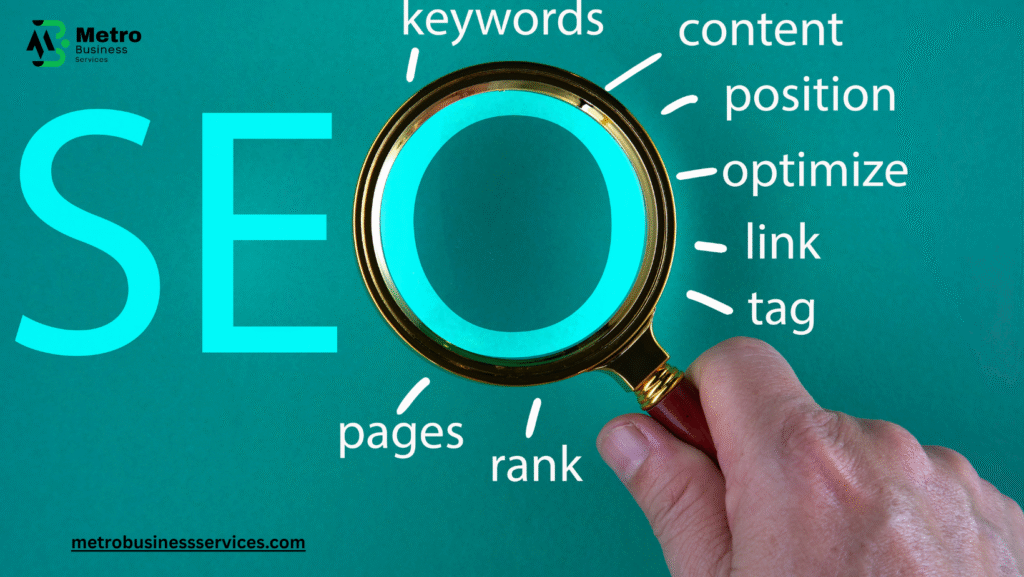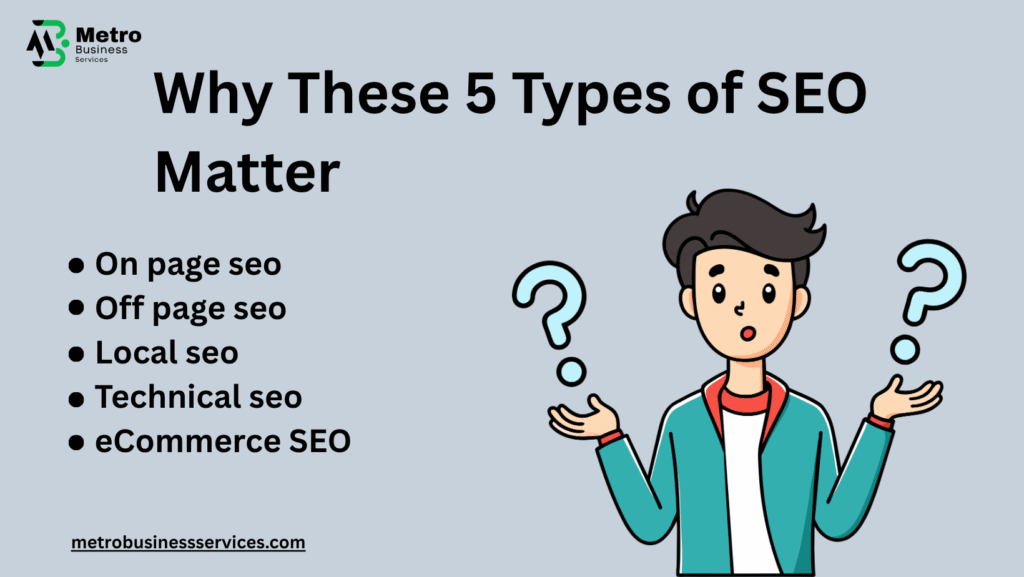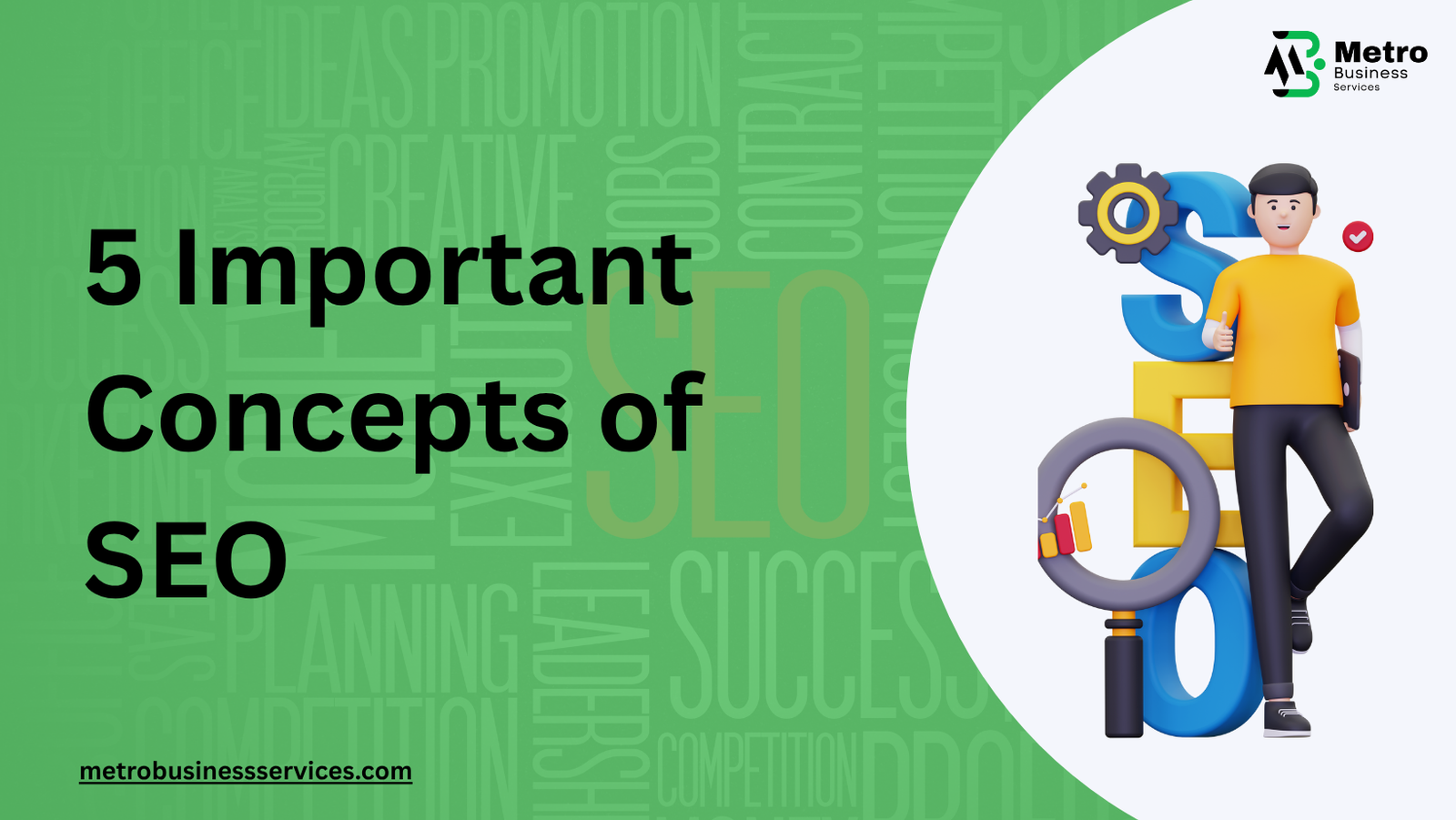Search Engine Optimization (SEO) is the foundation of successful digital marketing, encompassing essential strategies like local SEO, technical SEO, on-page SEO, off-page SEO, and ecommerce SEO. These strategies make up the 5 Important Concepts of SEO, which every business must understand to thrive online. In today’s competitive landscape, understanding the five core types of SEO can dramatically enhance a website’s visibility, traffic, and conversions. Whether you’re managing a local business website, optimizing ecommerce SEO product pages, or refining on-page SEO content, mastering these five pillars is essential. Let’s explore them in detail.
What is SEO?
SEO, or search engine optimization, is the process of improving a website’s visibility in search engine results. It involves optimizing content, structure, and external signals to enhance search performance.

Understanding the 5 Important Concepts of SEO like on-page, off-page, technical, local, and eCommerce SEO helps businesses attract organic traffic, boost authority, and rank higher for relevant keywords. Whether you’re using on-page techniques or off-page strategies, SEO is a vital part of digital growth.
Local SEO
Local SEO is a targeted strategy aimed at enhancing a business’s visibility in location-based search results. This includes Google Maps rankings, local pack listings, and nearby searches. It’s especially crucial for small businesses, service providers, and professionals looking to reach customers in a specific geographical area.
Key techniques include:
- Optimizing Google Business Profile listings
- Acquiring local citations and backlinks
- Using geo-specific keywords
- Implementing schema markup for local businesses
Businesses often search for the best local SEO company or affordable local SEO services to strengthen their reach. Tools like local SEO rapid URL indexer and software analytics help track performance effectively. If you’re a service provider or run multiple branches, tailoring your SEO strategy to each location enhances discoverability.
Why Should You Go for Local SEO?
Local SEO is essential for businesses looking to capture nearby customers and appear in geographically-relevant searches. Using local SEO services, localized keywords, and local SEO tools helps businesses dominate local SERPs, improve visibility in Google Maps, and gain trust through local citations.
Technical SEO
Technical SEO focuses on the backend aspects of a website to ensure search engines can crawl, index, and render your pages efficiently. It’s all about website infrastructure, speed, and security. A robust technical SEO strategy includes performing a comprehensive technical SEO audit checklist, utilizing advanced technical SEO tools, and resolving issues highlighted by tools like Google Search Console or Ahrefs. Whether you’re working with a technical SEO company, a freelance technical SEO expert, or using a white label technical SEO service, maintaining site health is essential. Optimization should cover structured data implementation, canonical tags, and mobile usability to align with technical SEO best practices for long-term search visibility.
Key elements include:
- XML sitemaps
- Robots.txt optimization
- Site speed improvements
- Mobile responsiveness
- HTTPS implementation
- Fixing crawl errors and broken links
A thorough technical SEO audit often reveals issues affecting rankings. Agencies offering technical SEO services use tools to diagnose problems, while technical SEO checklists ensure nothing gets missed. Whether you’re managing a WordPress site or an enterprise platform, technical SEO ensures your foundation is solid.
Why Should You Go for Technical SEO?
Investing in technical SEO ensures that your website is fast, secure, and easily crawlable by search engines. It helps identify and fix critical issues through a technical SEO audit and boosts visibility using structured data, mobile optimization, and technical SEO tools. Choosing a trusted technical SEO agency or expert ensures long-term performance and higher rankings.
eCommerce SEO
eCommerce SEO helps online stores increase their visibility across product and category pages, making it easier for customers to find what they’re looking for organically. By leveraging ecommerce SEO optimization techniques, businesses can enhance user experience and drive more sales. A strong ecommerce SEO strategy includes optimizing site structure, improving mobile performance, and ensuring technical SEO elements are in place. Ecommerce SEO agencies often conduct thorough ecommerce SEO audits to identify areas of improvement, ensuring that ecommerce product pages rank higher in search engines. Whether you’re a startup or a large brand, using ecommerce SEO services or hiring an ecommerce SEO consultant can be a game-changer for digital growth.
Effective strategies include:
- Optimizing product titles and meta descriptions
- Creating unique product descriptions
- Implementing structured data for rich snippets
- Enhancing site architecture and internal linking
- Managing duplicate content
Companies often seek the best ecommerce SEO services to compete with big platforms. With a tailored ecommerce SEO checklist and expert analysis, brands can boost their rankings and revenue. It’s crucial to understand how ecommerce SEO differs from regular strategies — product variations, filters, and user experience play a major role here.
Why Should You Go for eCommerce SEO?
eCommerce SEO is essential for increasing organic visibility and driving qualified traffic to your online store. By leveraging ecommerce SEO services, optimizing product listings, and using ecommerce SEO tools, businesses can improve search rankings and boost conversions. It’s a scalable strategy that supports long-term growth and ROI in competitive digital markets.
Off-Page SEO
Off-page SEO refers to actions taken outside your website to impact rankings within SERPs. This type focuses on building authority, trust, and relevance. Utilizing off-page SEO services and implementing effective link building strategies can significantly improve domain authority. Leveraging off-page SEO techniques such as guest posting and social media engagement strengthens your website’s credibility and search engine ranking.
Primary tactics include:
- Backlink building
- Social media signals
- Influencer outreach
- Guest blogging
- Online reputation management
Backlinks remain a key factor, and earning high-quality links from relevant domains helps build domain authority. Off-page SEO is crucial for businesses in competitive niches. Using a detailed off-page SEO checklist and monitoring backlinks regularly ensures your site stays in good standing.
Why Should You Go for Off-Page SEO?
Off-page SEO builds your website’s credibility and helps establish authority through backlinks, brand mentions, and social signals. By using trusted off-page SEO services and following proven off-page SEO strategies, you can significantly improve search rankings and drive referral traffi
On-Page SEO
On-page SEO involves optimizing individual pages to improve rankings and drive organic traffic. This includes both content and HTML source code. Applying on-page SEO best practices such as refining meta tags, optimizing content structure, and ensuring keyword relevance improves visibility. Using reliable on-page SEO tools and services can uncover optimization opportunities that boost search engine performance effectively.
Main components:
- Keyword placement and density
- Meta tags (title, description)
- Header tags (H1-H6)
- Image alt text
- Internal linking
- URL structure
Using an on-page SEO checker helps evaluate performance. Companies often look for on-page SEO services or use tools like Ahrefs or Moz to analyze elements. Whether for a single landing page or a 1000+ page site, on-page SEO is your direct control over how well your content is understood and ranked.
Why Should You Go for On-Page SEO?
On-page SEO is crucial because it gives you direct control over your website’s content and structure, which influences how search engines interpret your pages. Using on-page SEO techniques like optimizing title tags, meta descriptions, and keyword placement helps improve search visibility and click-through rates.
Why These 5 Types of SEO Matter
Each of the 5 Important Concepts of SEO targets a different aspect of website performance. Local SEO helps you reach customers near you, technical SEO ensures your site is accessible, eCommerce SEO brings products into visibility, off-page SEO builds trust, and on-page SEO communicates content clearly.

Together, they build a comprehensive strategy. Businesses that implement all five types of SEO often see improved search rankings, increased traffic, and better user experience. Brands like Metro Business Services leverage all these aspects to offer holistic SEO solutions that drive results.
Frequently Asked Questions
What are the 5 important concepts of SEO?
The five main types of SEO are local SEO, technical SEO, eCommerce SEO, off-page SEO, and on-page SEO. These work together to improve website visibility and search engine rankings.
What is local content in SEO?
Local content in SEO includes geo-targeted keywords, localized service pages, and blogs that improve visibility in local search results through local SEO strategies.
What are the benefits of local SEO?
Local SEO services boost local visibility, attract nearby customers, improve map rankings, and increase foot traffic for small businesses.
What is technical SEO?
Technical SEO involves optimizing backend elements like site speed, structured data, mobile-friendliness, and crawlability to enhance site performance.
What is SEO in technical terms?
In technical terms, SEO refers to optimizing a website’s infrastructure—such as sitemaps, HTTPS, and server responses—for search engines to index effectively.
What is on-page SEO?
On-page SEO includes optimizing content, meta tags, headers, and internal linking to ensure search engines and users understand your web pages.
What is an off-page in SEO?
Off-page SEO refers to external actions like backlink building, guest posting, and social engagement that boost your website’s authority and rankings.
Which of the following is off page SEO?
Backlinks, brand mentions, influencer collaborations, and social media shares are all examples of off-page SEO techniques.
How eCommerce SEO is different from normal SEO?
eCommerce SEO focuses on product and category page optimization, user experience, and structured data—unlike regular SEO which may prioritize content and service pages.
What is eCommerce optimization?
eCommerce optimization involves improving the visibility, usability, and conversion potential of online store elements using ecommerce SEO strategies and best practices.
Conclusion
Mastering the 5 Important Concepts of SEO—local SEO, technical SEO, eCommerce SEO, off-page SEO, and on-page SEO—is essential for building a strong digital presence. Each type contributes uniquely to increasing website traffic, improving search rankings, and delivering a seamless user experience. Whether you’re optimizing for local visibility, running an online store, or enhancing your site’s performance, a well-rounded SEO strategy brings long-term success. For businesses seeking expert support, Metro Business Services provides tailored SEO solutions that help you stay competitive and grow sustainably.

